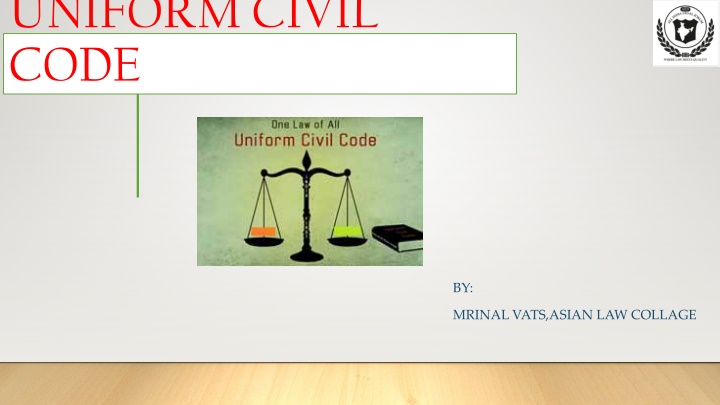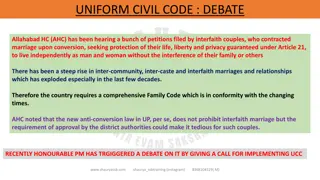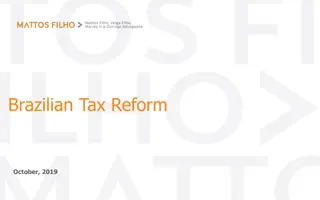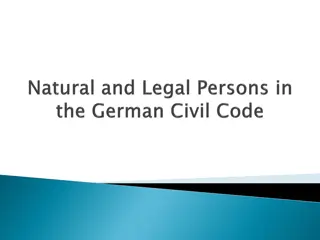Uniform Civil Code in India: A Proposal for Legal Reform
A proposal to implement a Uniform Civil Code in India, aiming to replace personal laws of major religious communities with a common set of laws for all citizens. Explore the history, significance, and need for a UCC, referencing important judicial verdicts and discussions on gender equality, marriage registration, and religious laws.
Download Presentation

Please find below an Image/Link to download the presentation.
The content on the website is provided AS IS for your information and personal use only. It may not be sold, licensed, or shared on other websites without obtaining consent from the author.If you encounter any issues during the download, it is possible that the publisher has removed the file from their server.
You are allowed to download the files provided on this website for personal or commercial use, subject to the condition that they are used lawfully. All files are the property of their respective owners.
The content on the website is provided AS IS for your information and personal use only. It may not be sold, licensed, or shared on other websites without obtaining consent from the author.
E N D
Presentation Transcript
UNIFORM CIVIL CODE BY: MRINAL VATS,ASIAN LAW COLLAGE
INTRODUCTION A PROPOSAL TO REPLACE THE PERSONAL LAWS OF EACH MAJOR RELIGIOUS COMMUNITIES IN INDIA WITH A COMMON SET GOVERNING EACH CITIZEN. MENTIONED IN ARTICLE 44 OF THE DIRECTIVE PRINCIPLES. ARTICLE 44 OF THE CONSTITUTION OF INDIA SAYS THAT THE STATE SHALL ENDEAVOUR TO SECURE FOR THE CITIZENS A UNIFORM CIVIL CODE THROUGHOUT THE TERRITORY OF INDIA . EARLIER IT FOCUSED ON THE MUSLIM PERSONAL LAWS.
HISTORY OF UNIFORM CILIVIL CODE THE ORIGIN OF THE UCC DATES BACK TO COLONIAL INDIA WHEN THE BRITISH GOVERNMENT SUBMITTED ITS REPORT IN 1835 STRESSING THE NEED FOR UNIFORMITY IN THE CODIFICATION OF INDIAN LAW RELATING TO CRIMES, EVIDENCE, AND CONTRACTS, SPECIFICALLY RECOMMENDING THAT PERSONAL LAWS OF HINDUS AND MUSLIMS BE KEPT OUTSIDE SUCH CODIFICATION. BRITISH GAVE SELF-GOVERNMENT IN DOMESTIC MATTERS AND ABSOLUTE NON- INTERFERENCE IN RELIGIOUS MATTERS. HINDU MARRIAGE ACT, SUCCESSION ACT, MINORITY AND GURDIANSHIP ACT AND ADOPTION AND MAINTENANCE ACT PASSED IN 1956. THE SPECIAL MARRIAGE ACT,1954 PERMITTED ANY INDIAN TO HAVE THEIR MARRIAGE OUTSIDE THE REALM OF THEIR RELIGIOUS PERSONAL LAW.
NEED FOR UNIFORM CIVIL CODE TO PROVIDE JUSTICE AND EQUALITY TO THE PEOPLE OF ALL RELIGIONS AND SECTS. ENACT RULES FOR COMPULSORY REGISTRATION OF MARRIAGES IRRESPECTIVE OF RELIGION. TRIPLE TALAQ CONTROVERSY. MUSLIM LAW DOESN T PROVIDE MAINTENANCE FOR THE WIFE.THE MEHR AMOUNT IS SUPPOSED TO TAKE CARE OF THIS ASPECT. TO CONTROL POLYGAMY. UCC IS ALSO NECESSARY FOR OUR NATIONAL SECURITY AND SECULARIM.
IMPORTANT JUDGEMENT Smt. Sarla Mudgal, President, ... vs Union Of India & Ors on 10 May, 1995 The verdict discusses issue of bigamy, the conflict between the personal laws existing on matters of marriage and invokes article 44 of Indian Constitution. It is considered a landmark decision that highlighted the need for a uniform civil code. Shah Bano Case,1985: The case of Mohd. Ahmad Khan vs. Shah Bano Begum & Ors. also called the Shah Bano case is seen as one of the milestones in Muslim women s fight for rights in India and the battle against the set Muslim personal law. It laid the ground for thousands of women to make legitimate claims which they were not allowed before.
Recently, the Delhi High Court expressed the need for having a Uniform Civil Code after noting that the Indian society is gradually becoming homogenous while the traditional barriers are slowly disappearing. The Bench of Justice Pratibha M Singh observed, "In modern Indian society which is gradually becoming homogenous, the traditional barriers of religion, community and caste are slowly dissipating. The youth of India belonging to various communities, tribes, castes or religions who solemnise their marriage ought not to be forced to struggle with issues arising due to conflicts in various personal laws, especially in relation to marriage and divorce."
THE GOA MODEL GOA IS THE ONLY STATE IN INDIA WHICH HAS ENFORCED UNIFORM CIVIL CODE FOR ALL ITS CITIZEN. ALLOWS EQUAL DIVISON OF INCOME AND PROPERTY REGARDLESS OF GENDER BETWEEN HUSBAND,WIFE AND BETWEEN CHILDREN. SEVERE PROVISIONS FOR DIVORCE. NO POLYGAMY OR TRIPLE TALAQ FOR GOAN MUSLIMS. EACH SPOUSE IN THE CASE OF DIVORCE IS ENTITLED TO A HALF SHARE OF THE PROPERTY.
CONCLUSION A COMMON CIVIL CODE,TO GOVERN PERSONAL MATTERS OF ALL CITIZENS IRRESPECTIVE OF RELIGION IS THE NEED OF THE HOUR. A COMMITTEE OF EMINENT JURISTS SHOULD BE CONSIDERED TO MAINTAIN UNIFORMITY. CARE MUST BE TAKEN NOT TO HURT THE SENTIMENTS OF ANY PARTICULAR COMMUNITY. PRACTISES LIKE TRIPLE TALAQ,NIKAH HALALA AND POLYGAMY SHOULD BE BANNED.
H THE GOVERNMENT MUST PREPARE A GOOD ENVIRONMEMT FOR UNIFORM CIVIL CODE BY EXPLAINING THE CONTENT AND SIGNIFICANCE OF ARTICLE 44. THE PRESS ,RADIO,TELEVISION AND VARIOUS OTHER MEANS OF COMMUNICATION MUST HELP. CONSERVATIVE SECTIONS OF THE SOCIETY MUST BE MADE TO UNDERSTAND THE UTILITY OF UNIFORMITY OF THE LAW. EDUCATION,AWARENESS AND SENSITIZATION PROGRAMMES MUST BE TAKEN UP.























